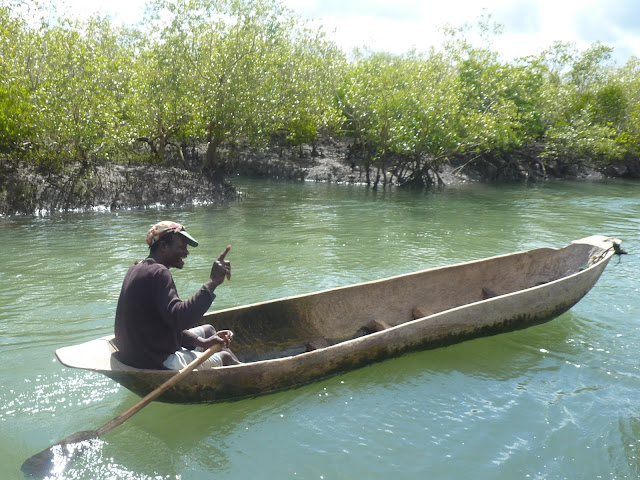These are our fairly new investigators, Veronica and Gaspar. Their new twin sons, who we adore and are ready to adopt or steal are Santo and Santinho. Those names can be translated as Saint and Little Saint. (Yes, the naming scheme is even considered strange by Mozambicans--it reminds me a bit of George Forman). When we teach them, they always sit on the reed mat pictured here and give us the two chairs (which are the only furniture in their mud house). Gaspar is bright and reads and thinks well--Veronica is bright, but like many women, can't read at all) Both are people of growing faith and are enjoying and are well engaged in our teaching.
Veronica explained to us that she wasn't producing sufficient milk for the kids so she was feeding them condensed milk mixed with flour. They were sick and losing weight. In later discussion we learned that she wasn't producing much milk because she was not eating, and not eating simply for lack of food and lacking food for lacking work and money. The kids looked pathetic and both had diarrhea. Had they not been so cute, perhaps we would have felt differently, but we bought a couple month supply of baby formula (assisted by the Wollenziens) and milk and rice and beans for mom. We came back today and were very pleased with the change, babies were healthier and pigging out and Veronica was looking much better as well.
I often consider the futility of feeding a couple of kids here when hundreds of thousands of people are starving, but it really seemed like they would be lost without some intervention--perhaps not a world-scale tragedy, but a local one--and we live locally and have come to love the locals. We won't bring food to the family again, but likely are in it for the long haul for formula for the kids. In the end, Gaspar has to find work. He goes out every day doing day labor when he can find it. We would suggest school for him (and help him with it) but his dependants wouldnt survive a break in the meager bit that he manages to earn.
The neighborhood in which this family lives, called " Floresta" has become the area of principal activity for Debbie and me. It is a little distant from the city center, so us being vehicular makes it more practical for us than for the young missionaries. We just started with one family there, and have never really made a huge effort to find others, but one person talks to their friends and we are friendly and say hello to people as we walk along and suddenly we have quite a few people around here that are fully engaged in atending church and listening to our message--though the walk each way to church is probably somewhere around 3 kilometers. We had earlier thought that we would cap our own teaching pool at 4 families at a time, as our assignment includes other responsibilities--but we have climbed above that now and we are finding it hard to stick with that resolution. We do love teaching and it is hard to say no to people who really want to learn.
Today was a baptism day in Quelimane with three relatively young men joining our ranks. Patel, Iris, and Rema. Shown are also Elders Peterson, Maynez, Delgado and McCullough. Elder Peterson, who will go home in June organized and conducted the service and did a very thoughtful and wonderful job of it.
100%I have somehow lost my glasses here and can't locate the extra pair that I could swear that I had brought as a backup. I didn't realize how blind I had become. Luckily we have a pair of reading magnifiers that will help me survive until our children come and visit at the end of June.
I had a delightful skype conversation with a friend this morning who in due course, mentioned an employment opportunity for me upon our return to civilization. How strange it felt to turn my thinking in that direction. I will likely start worrying about that in earnest in a few months, but for now I can be somewhat blissfully oblivious to the workaday world.


















































